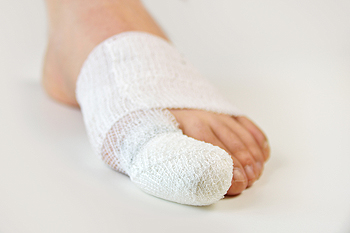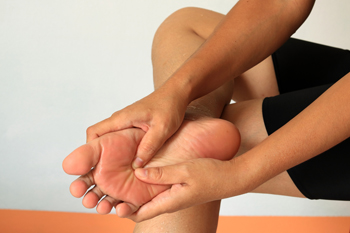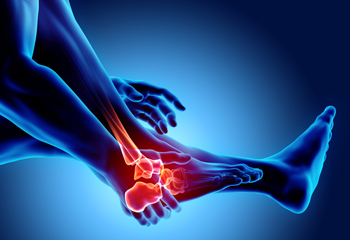Items filtered by date: May 2021
It's Time for Beautiful Feet
Symptoms of Diabetic Neuropathy
 Diabetic neuropathy is a common complication of diabetes that causes nerve damage in the hands and feet. Neuropathy tends to develop slowly, sometimes over several decades, so people with diabetes are urged to closely monitor their foot health. The symptoms of diabetic neuropathy include a “pins and needles” sensation in the feet, sensitivity to touch or a loss of touch, pain, numbness, tingling, burning, difficulties with coordination while walking, and muscle weakness. Diabetic neuropathy can be dangerous and lead to serious complications, as the loss of sensation that it causes in the feet can make foot wounds more likely to form. These wounds tend to heal poorly and may become infected. If you have diabetes, a podiatrist can help you maintain the health of your feet.
Diabetic neuropathy is a common complication of diabetes that causes nerve damage in the hands and feet. Neuropathy tends to develop slowly, sometimes over several decades, so people with diabetes are urged to closely monitor their foot health. The symptoms of diabetic neuropathy include a “pins and needles” sensation in the feet, sensitivity to touch or a loss of touch, pain, numbness, tingling, burning, difficulties with coordination while walking, and muscle weakness. Diabetic neuropathy can be dangerous and lead to serious complications, as the loss of sensation that it causes in the feet can make foot wounds more likely to form. These wounds tend to heal poorly and may become infected. If you have diabetes, a podiatrist can help you maintain the health of your feet.
Neuropathy
Neuropathy can be a potentially serious condition, especially if it is left undiagnosed. If you have any concerns that you may be experiencing nerve loss in your feet, consult with Donald Manger, DPM from Associated Podiatric Physicians, PA. Our doctor will assess your condition and provide you with quality foot and ankle treatment for neuropathy.
What Is Neuropathy?
Neuropathy is a condition that leads to damage to the nerves in the body. Peripheral neuropathy, or neuropathy that affects your peripheral nervous system, usually occurs in the feet. Neuropathy can be triggered by a number of different causes. Such causes include diabetes, infections, cancers, disorders, and toxic substances.
Symptoms of Neuropathy Include:
- Numbness
- Sensation loss
- Prickling and tingling sensations
- Throbbing, freezing, burning pains
- Muscle weakness
Those with diabetes are at serious risk due to being unable to feel an ulcer on their feet. Diabetics usually also suffer from poor blood circulation. This can lead to the wound not healing, infections occurring, and the limb may have to be amputated.
Treatment
To treat neuropathy in the foot, podiatrists will first diagnose the cause of the neuropathy. Figuring out the underlying cause of the neuropathy will allow the podiatrist to prescribe the best treatment, whether it be caused by diabetes, toxic substance exposure, infection, etc. If the nerve has not died, then it’s possible that sensation may be able to return to the foot.
Pain medication may be issued for pain. Electrical nerve stimulation can be used to stimulate nerves. If the neuropathy is caused from pressure on the nerves, then surgery may be necessary.
If you have any questions, please feel free to contact our office located in Hamilton Township, NJ . We offer the newest diagnostic and treatment technologies for all your foot care needs.
What to Do if You Have Morton's Neuroma
Morton’s neuroma is a condition in which the nerve tissue located in the ball of the foot, between the toes, becomes inflamed. This causes symptoms such as sharp pain in the bottom of the foot, tingling, burning, numbness, or the sensation that you are walking on a pebble or that something is stuck in the ball of your foot. Morton’s neuroma can often fully resolve with conservative treatments such as resting and icing the foot, wearing wide and comfortable shoes, wearing orthotic inserts, and taking over the counter medications to reduce pain. Your podiatrist can also relieve Morton’s neuroma pain by injecting cortisone directly into the foot. In rare cases, symptoms may be persistent and could require surgical intervention. Consult with a podiatrist to find out which treatment method would be best for you.
Morton’s neuroma is a very uncomfortable condition to live with. If you think you have Morton’s neuroma, contact Donald Manger, DPM of Associated Podiatric Physicians, PA. Our doctor will attend to all of your foot care needs and answer any of your related questions.
Morton’s Neuroma
Morton's neuroma is a painful foot condition that commonly affects the areas between the second and third or third and fourth toe, although other areas of the foot are also susceptible. Morton’s neuroma is caused by an inflamed nerve in the foot that is being squeezed and aggravated by surrounding bones.
What Increases the Chances of Having Morton’s Neuroma?
- Ill-fitting high heels or shoes that add pressure to the toe or foot
- Jogging, running or any sport that involves constant impact to the foot
- Flat feet, bunions, and any other foot deformities
Morton’s neuroma is a very treatable condition. Orthotics and shoe inserts can often be used to alleviate the pain on the forefront of the feet. In more severe cases, corticosteroids can also be prescribed. In order to figure out the best treatment for your neuroma, it’s recommended to seek the care of a podiatrist who can diagnose your condition and provide different treatment options.
If you have any questions, please feel free to contact our office located in Hamilton Township, NJ . We offer the newest diagnostic and treatment technologies for all your foot care needs.
Helping Someone You Love With Arthritis
While it can be difficult to watch someone you care about suffer with rheumatoid arthritis, there are some things you can do that may help them deal with their illness and possibly even reduce pain in their feet and ankles. Try to reduce the swelling in your loved one’s joints with progressive relaxation—a technique where the muscles are tensed and then relaxed, working up from the feet. Their pain from swollen joints can also sometimes be eased by icing them with an ice pack or even a bag of frozen peas which conform to the joint’s shape. Help your loved one choose the right foods to maintain a healthy body weight to reduce the amount of pressure put on the joints of the feet, hips, and knees. You can also schedule an appointment for your loved one with a podiatrist for an exam, and to discuss if doing certain physical activities like tai chi, yoga, aqua therapy, or walking may help to strengthen their muscles and reduce their pain.
Because RA affects more than just your joints, including the joints in your feet and ankles, it is important to seek early diagnosis from your podiatrist if you feel like the pain in your feet might be caused by RA. For more information, contact Donald Manger, DPM of Associated Podiatric Physicians, PA. Our doctor will assist you with all of your podiatric concerns.
What Is Rheumatoid Arthritis?
Rheumatoid Arthritis (RA) is an autoimmune disorder in which the body’s own immune system attacks the membranes surrounding the joints. Inflammation of the lining and eventually the destruction of the joint’s cartilage and bone occur, causing severe pain and immobility.
Rheumatoid Arthritis of the Feet
Although RA usually attacks multiple bones and joints throughout the entire body, almost 90 percent of cases result in pain in the foot or ankle area.
Symptoms
- Swelling and pain in the feet
- Stiffness in the feet
- Pain on the ball or sole of feet
- Joint shift and deformation
Diagnosis
Quick diagnosis of RA in the feet is important so that the podiatrist can treat the area effectively. Your doctor will ask you about your medical history, occupation, and lifestyle to determine the origin of the condition. Rheumatoid Factor tests help to determine if someone is affected by the disease.
If you have any questions please feel free to contact our office located in Hamilton Township, NJ . We offer the newest diagnostic and treatment technologies for all your foot and ankle needs.
Turf Toe Severities
 Turf toe is one of the most common foot injuries among athletes and refers to a sprain of the first metatarsophalangeal (MTP) joint located just below the big toe. When this joint is injured, it also often damages the surrounding ligaments, causing pain when you try to walk, jog, run, or jump. Turf toe can be classified based on how severe the injury is. A mild injury involves minor stretching of one or more ligaments in the MTP joint and is associated with tenderness, discomfort, and mild swelling. A moderate injury involves partial tearing of the ligament or joint capsule and causes pain, swelling, and difficulty walking. A severe injury involves a complete rupture of the ligaments or joint capsule and pain may be severe and make walking impossible. If you have any foot or ankle injuries, please seek the care of a podiatrist.
Turf toe is one of the most common foot injuries among athletes and refers to a sprain of the first metatarsophalangeal (MTP) joint located just below the big toe. When this joint is injured, it also often damages the surrounding ligaments, causing pain when you try to walk, jog, run, or jump. Turf toe can be classified based on how severe the injury is. A mild injury involves minor stretching of one or more ligaments in the MTP joint and is associated with tenderness, discomfort, and mild swelling. A moderate injury involves partial tearing of the ligament or joint capsule and causes pain, swelling, and difficulty walking. A severe injury involves a complete rupture of the ligaments or joint capsule and pain may be severe and make walking impossible. If you have any foot or ankle injuries, please seek the care of a podiatrist.
Sports related foot and ankle injuries require proper treatment before players can go back to their regular routines. For more information, contact Donald Manger, DPM of Associated Podiatric Physicians, PA. Our doctor can provide the care you need to keep you pain-free and on your feet.
Sports Related Foot and Ankle Injuries
Foot and ankle injuries are a common occurrence when it comes to athletes of any sport. While many athletes dismiss the initial aches and pains, the truth is that ignoring potential foot and ankle injuries can lead to serious problems. As athletes continue to place pressure and strain the area further, a mild injury can turn into something as serious as a rupture and may lead to a permanent disability. There are many factors that contribute to sports related foot and ankle injuries, which include failure to warm up properly, not providing support or wearing bad footwear. Common injuries and conditions athletes face, including:
- Plantar Fasciitis
- Plantar Fasciosis
- Achilles Tendinitis
- Achilles Tendon Rupture
- Ankle Sprains
Sports related injuries are commonly treated using the RICE method. This includes rest, applying ice to the injured area, compression and elevating the ankle. More serious sprains and injuries may require surgery, which could include arthroscopic and reconstructive surgery. Rehabilitation and therapy may also be required in order to get any recovering athlete to become fully functional again. Any unusual aches and pains an athlete sustains must be evaluated by a licensed, reputable medical professional.
If you have any questions please feel free to contact our office located in Hamilton Township, NJ . We offer the newest diagnostic and treatment technologies for all your foot and ankle needs.



